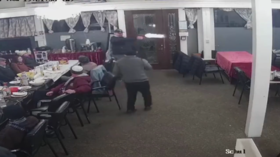Professor convicted for deadly synagogue bombing

A French court has sentenced a Lebanese-Canadian sociologist to life in prison for bombing a synagogue in Paris in 1980. The trial, conducted without the suspect’s presence, was described by Amnesty International as “baseless and flawed.”
The court handed down a life sentence to Hassan Diab, a citizen of both Lebanon and Canada who lives and teaches in Ottawa, on Friday. Diab refused to participate in the trial and the verdict was reached in absentia. The court issued an arrest warrant for Diab, whose lawyers argued that he was simply in the wrong place at the wrong time.
French prosecutors accused Diab of planting a motorcycle bomb outside a synagogue on Rue Copernic in Paris on October 3, 1980. The bomb went off as more than 300 worshippers were gathered inside the building, killing four and injuring 46.
Investigators initially suspected neo-Nazi terrorists of the attack, before blaming Palestinian militants. Canadian authorities arrested Diab in 2008 on behalf of French authorities, who claimed that the professor resembled a photofit depiction of the bomber.
Diab was extradited to France in 2014, charged with murder, and imprisoned. The case against him was dropped due to insufficient evidence in 2018 and Diab returned to Canada. However, a French appeals court ordered the case reopened in 2021.
Diab’s lawyers argued that he was studying in Beirut at the time of the attack. None of the original investigators were alive to testify, and witnesses who saw the attacker admitted that their memories had faded in the intervening four decades. Prosecutors said that Diab’s passport was found at an Italian airport in 1981 in the possession of a Palestinian militant leader, but Diab claimed that he lost the document a month before the bombing.
“From the outset of extradition proceedings in Canada fourteen years ago and continuing throughout legal proceedings in France over the past seven years, Canadian and French judges…have consistently found the evidence against him to be weak, unreliable and inconclusive,” Amnesty International wrote last month, calling on French authorities to drop their “baseless and flawed” case.
It is unclear whether Canadian authorities will extradite Diab to France to serve his sentence.













